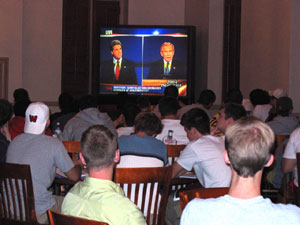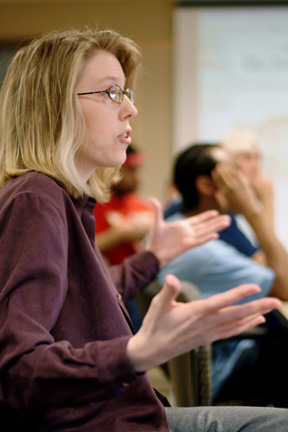 While political science and speech classes have paid particular attention to this year’s political debates, television ratings and poll numbers suggest more Americans than ever have tuned in to the three presidential debates.
While political science and speech classes have paid particular attention to this year’s political debates, television ratings and poll numbers suggest more Americans than ever have tuned in to the three presidential debates.
Wabash College’s Assistant Professor of Speech Jennifer Young organized campus gatherings for the first two debates and engaged students in discussion following each. (See accompanying photo from the first debate attended by more than 75 students.) With Wabash on fall break, no organized viewing took place Wednesday night.
Instead, Young and Visiting Speech Instructor David Moscowitz were asked to offer their impressions of Wednesday’s third and final debate between President George Bush and Senator John Kerry.
Here are their thoughts on the two candidates performance:
Moscowitz: "Perhaps it was simply the domestic issues theme of this final debate, or perhaps the two teams have recognized their presence has been underplayed in the past two debates, but tonight was clearly the "Debate of the Woman." The post-debate spin confirmed as much. While Karen Hughes always responds on Bush's behalf, Kerry's team filters in different folks. Tonight it was Mary Beth Cahill responding, who continued Kerry's pitch to the soccer/security moms. While Cahill had a typical Kerry/Edwards sign proclaiming the standard "A Stronger America" behind her, the banner behind Hughes was a slogan I haven't seen before: "Bush Stands for Women." No subtlety there."
Young: "I thought it was a rather even-handed debate. Bush appeared more confident and prepared toward the beginning, and Kerry appeared more impassioned and mentally sharp toward the end - as though he warmed up as he went along. In addition, both candidates appeared to have learned from their mistakes in previous debates. Bush spoke more calmly and less defensively than in the past, making sure to smile rather than scowl, and restraining himself (most of the time) from jumping into a rebuttal before it was granted by the moderator. Kerry spoke more often to the camera than he has in the past, targeting his comments even more than usual to "us," the viewers.
Moscowitz: "Both candidates have gradually increased their use of humor. I was surprised neither candidate played "the humor card" more, though. Nevertheless, when used, I felt it was very effective for both candidates, particularly when responding at the end to the query about the strong women in their lives. Nevertheless, Kerry's use of humor might prove to be more beneficial than Bush's because it made him appear confident and strong (that he doesn't wilt to harangues about "marrying up" to a rich heiress) as well as easygoing and approachable—qualities that have not been easily associated with him. Bush's use of humor could be interpreted as merely consistent with his existing image (folksy, quaint, and unassuming) or, to the complaint of some, continuing his anti-intellectual self-deprecation (regarding how Laura talks better)."
 Young: I typically avoid making comments about candidates' styles, because I think that such comments focus our attention too much on the artifice of the debate rather than its substance. However, this debate invited viewers to base their conclusions more on their impressions of the candidates' styles than on the candidates' positions on issues. One reason is that Schieffer only rarely granted the candidates follow-up rebuttals. That decision prevented the candidates from more fully developing their positions and more clearly revealing their similarities and differences. A second reason is that, once again, the candidates bombarded the audience with contrasting statistics, leaving our heads spinning in bewilderment. My cynical hunch is that most of us who watched the debate will not follow it up by checking the facts. Consequently, we're left with our impressions of who looked or sounded like they were telling the truth. I suspect that the candidate we were already cheering for is the candidate who we think appeared more authentic.
Young: I typically avoid making comments about candidates' styles, because I think that such comments focus our attention too much on the artifice of the debate rather than its substance. However, this debate invited viewers to base their conclusions more on their impressions of the candidates' styles than on the candidates' positions on issues. One reason is that Schieffer only rarely granted the candidates follow-up rebuttals. That decision prevented the candidates from more fully developing their positions and more clearly revealing their similarities and differences. A second reason is that, once again, the candidates bombarded the audience with contrasting statistics, leaving our heads spinning in bewilderment. My cynical hunch is that most of us who watched the debate will not follow it up by checking the facts. Consequently, we're left with our impressions of who looked or sounded like they were telling the truth. I suspect that the candidate we were already cheering for is the candidate who we think appeared more authentic.
Moscowitz: "I believe this debate was fairly consistent with the first two - Bush, much more than Kerry, continues the tried-and-true method of repeating a sound bite in the hopes that it'll catch on. In the past two, it was the "wrong war wrong time" one - tonight, perhaps sensing that the war one was/is tired, he tried out various forms of Kerry's rhetoric not matching his record - it's alliterative and simple -perhaps it'll catch on ... or perhaps Americans are continuing to become more savvy to these tactics, as seemed to be the case with the first debate when Bush was criticized for repeating the same claims and statements in overly simplistic fashion. Repetition is always effective in an oral medium, but Bush might be abusing its potential here. Time and polls may tell, and may signal changes in strategy for years to come if the American public continues to become savvier to tactics that it deems tired and/or predictable. I wonder if Bush's ad hominem attacks - the reprise of the nasty "L" word, liberal, will catch on - he tried it in Missouri, but I didn't get the sense that it was all that compelling with the public."
Young: "From a more purely rhetorical standpoint, I was fascinated by each candidate’s attempt to identify himself with the audience. I was interested in how each man defined "us" and "them." Bush's repeated references to Kerry as the liberal Senator from Massachusetts (read "liberal" and "Massachusetts" as dirty words) revealed his attempt to identify himself with "us" as mainstream centrists against Kerry and "them," the left-wing lunatics. Kerry, on the other hand, often looked into the camera and appealed to "us," whom he characterized as average, struggling Americans, who "all know" first-hand the failures of the Bush administration. He aligned himself with "us" against Bush and "them," whom Kerry defined as the economic elite and corporate interests. Bush's definitions operated in partisan terms (liberal versus centrist), while Kerry's characterizations functioned in economic terms (the struggling poor versus the corporate elite). These sets of terms are important, because they differently shape our interpretations of - and, thus, our attitudes about and actions toward--the candidates and issues. If either candidate can convince us to adopt his terms, then he is more likely to win our support. A rhetorical truism in all debate is that the person, who successfully defines the terms of the debate, wins."
Moscowitz: "Compared to the first debate, which followed the same moderator/podium format, I felt both candidates improved. Bush's responses were pretty poor and strange-looking early on, but he seemed to grow more comfortable as the debate progressed. If you watch Bush speak, you see that he has two kinds of smiles, which might reveal something about his sincerity and confidence regarding what he's saying. At the beginning of tonight's debate, he featured the more tentative, more pained, more grimaced-looking smile, the one that implores his audience for affirmation and approval. It is not a good look for him. As he eased, however, his smile transitioned into the one you see more often in public appearances: that more ornery smile, the one that is accompanied by that glint in his eyes; it's a smile that does not appear to depend on his audience's reaction, but instead expresses cool assurance that what he says is right and true. Like it or not, this is the one that seems to work for Bush, and this is what that pained smile became as the debate progressed. The way Kerry improved, I felt, is that he looked at the camera (us, the viewers) more than the moderator this time around. He sought to expand his sense of approachability, immediacy, and identification with Joe and Jane Voter and I believe he was even more effective here than in the first debate."